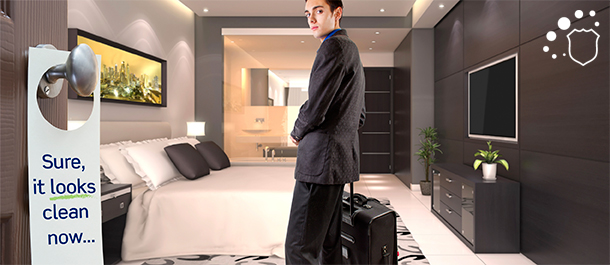Grossed out by hotel rooms? Stay calm, there’s hope for improved cleanliness

Vacations are a time for rest, relaxation and sometimes travel. So when you’re staying in a hotel, the last thing you want to worry about is whether or not your room is thoroughly clean. Even when traveling for business, the peace of mind that comes with staying in a clean room is priceless. But let’s face it, whether or not your germaphobic tendencies come out when you’re staying at a hotel, there’s always going to be that question in the back of your head:
Are hotel managers really doing all they can to protect their facilities from the growth of bacteria?
A small independent study carried out in three hotel rooms in three different states – Texas, Indiana and South Carolina – revealed that light switches and TV remote controls in hotel rooms carry alarmingly high amounts of bacteria. The study was conducted with hopes to inspire the hotel industry to adopt better cleaning and sanitation guidelines.
Researchers collected samples from 19 surfaces in the rooms and tested them for aerobic bacteria, including harmful microbes such as streptococcus and staphylococcus, as well as fecal bacteria coliform. The measurements were taken in colony-forming units of bacteria (CFU) per cubic centimeter squared.
The results are exactly what you’d (unfortunately) expect: bathroom sinks and floors, main light switches and the TV remotes carry the most bacteria in hotel rooms. TV remotes were a major culprit of germs measuring an average of 67.6 CFU, but the study found that the main light switches had the highest average number of both bacteria tested – 122.7 CFU of aerobic bacteria and 111.1 CFU of fecal bacteria.
The sheer nature of the hotel industry is a quick room turnover rate, and with limited staff and cleaning hours, hotels are looking for alternate solutions to help keep their facilities cleaner. Thankfully, these solutions exist. Antimicrobial treated switches and wallplates are designed to keep their surfaces cleaner by inhibiting 99.9% of bacterial growth in between normal cleaning cycles. Finally, that peace of mind is becoming a possibility.


